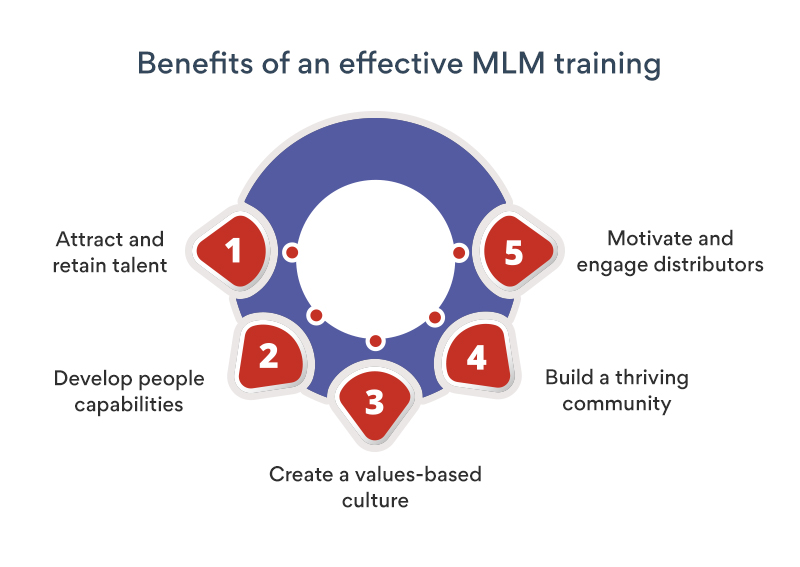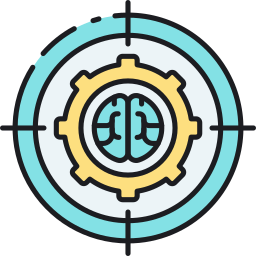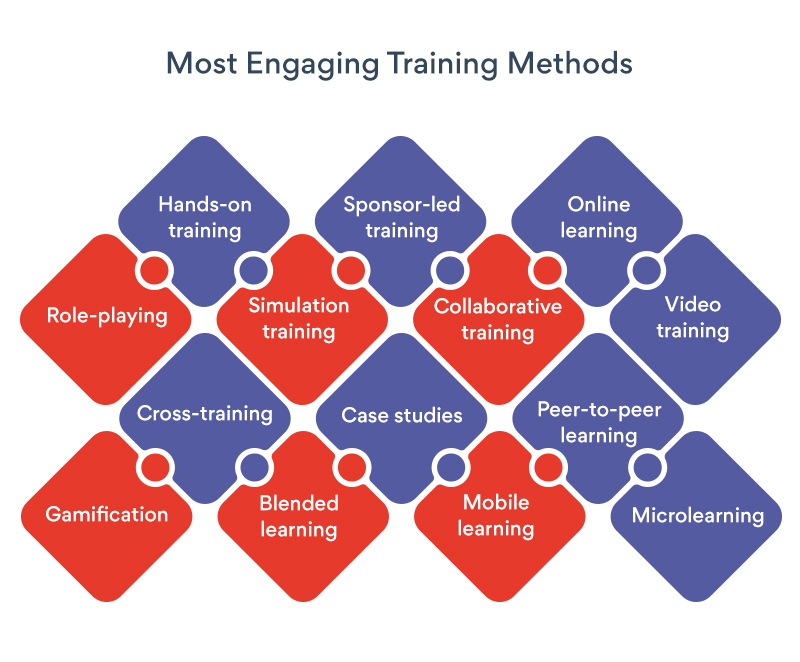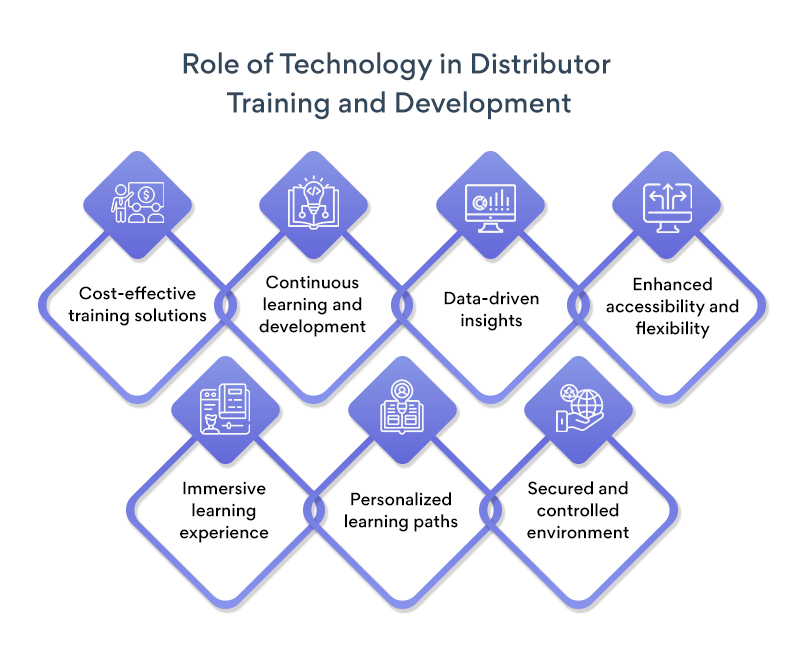MLM training: Equipping distributors with essential skills to drive growth and development

Introduction
Priorities of the workforce have changed in this post-pandemic era. Instead of settling down with what the company has offered for a long time, today’s people seek to learn more from their company and grow more with their company. Research shows that this is a major factor in the "Great Resignation," with 50% of employees considering leaving their company due to a lack of training. To win over today’s workforce, companies must put in their maximum efforts in training. A clear path toward skill development and career advancement is all they expect. With proper training methods, businesses are sure to retain top talent, boost engagement, and future-proof their workforce for success in a changing world.
In multi-level marketing businesses, from small startups to large enterprises, distributors are the ones who connect companies with customers, so they need to know a lot and be good at what they do. This is where empowering distributors through effective MLM training comes in and is one of the most important steps that ensures their ongoing growth.

The beginnings of MLM training comprise of comprehensive distributor onboarding process and extends to providing them with personalized sessions and tracking their success. Such training helps them understand products, sell better, and keep up with what's happening in the market.
Epixel MLM Software has carefully studied the effective ways to enhance distributor training program. By integrating with sophisticated direct sales tools, the software is all set to streamline MLM operations. These tools also help distributors improve their marketing skills and reward their hard work with fair compensation so that they feel valued and motivated throughout their MLM journey.
Importance of distributor training in MLM
Today more than ever, companies are striving hard to provide the right skills to the right people at the right time. Top businesses consider "People Skills" as one of the top 4 “External forces impacting the enterprise”. In fact,
84% of employees in best performing organizations receive the training they need when compared with 16% in the worst performing companies.
— IBM report
In MLM businesses, the key lies in embracing the right level of distributor training programs. This fosters distributor enablement and engagement which in turn reduces distributor attrition rate. Let’s now analyze the importance of providing comprehensive MLM training for distributors from day one.
Drive productivity through enhanced performance
Informed distributors, empowered distributors. Proper training develops the skills and knowledge necessary for distributors to perform their tasks more effectively. It helps them understand the products, the sales process, and the company’s objectives. Improved job performance equals higher productivity and better business results.
Improves marketing skills to increase sales efforts
Upskilled distributors, increased profitability. MLM training programs often focus on sharpening the sales and marketing skills of distributors. These programs details on prospecting approaches to adopt, coming up with attractive presentations, and closing sales with confidence. With this, distributors can grasp the very basics of effective communication, handling rejections, relationship building, and the art of storytelling to engage potential customers and convert them into loyal buyers. It enhances team building efforts, thereby expanding their network and potential earnings.
Boosts market penetration to reach broader audience
Well-trained distributors, stronger brand image. They can find and make the most of new market opportunities by using their deep product knowledge and effective sales techniques. It’s easy for the salesforce to tap into different market segments or geographical locations where the business hasn’t reached before.
Mitigates distributor turnover challenges
Inadequate training, high distributor attrition. Individuals from various backgrounds join MLM for extra income or entrepreneurial fulfillment, but without proper training, they may struggle to identify a sense of purpose and eventually quit. Providing ongoing training along with utilizing fun tools like gaming modules and tailored training programs increases their commitment to the company and a greater chance of reduction in turnover rates.
Boosts distributor loyalty with ongoing support
Constant support, satisfied distributor. Resourceful support and guidance throughout the training make distributors feel that their voice matters and is valued. When their concerns are wholeheartedly welcomed and addressed then and there, their loyalty to the company grows alongside. They become brand advocates who are invested in the long-term success of the MLM organization.
Fosters robust customer relationships with exceptional service
Higher customer satisfaction, repeat business. Well-trained distributors really understand what customers need. They try to meet customer expectations consistently to build robust relationships. Training equips distributors with great communication skills, product knowledge, and the ability to handle customer concerns neat and clean. This leads to positive word-of-mouth promotion, higher brand loyalty, and attracts more new customers.
Ensures adherence to compliance challenges
Complex legal framework, compliance required. When compliance training becomes a mainstay in training programs, then MLM organization need no worries about being penalized for their distributors' unintentional actions. Mandating training on legal, tax, and industry compliance practices ensures distributors understand and follow these rules. It reduces legal risks and protects the company's reputation.
MLM training best practices
Effective MLM training is the cornerstone of building a successful downline and achieving organizational objectives. But, to cut to the chase, distributor training is not all about never-ending lectures. It's also about building a well-rounded team. To do that, the first baby step is to know the reasons behind distributors’ take in the MLM journey and what encourages them to stay. Or to put it in an easy way, what are the key drivers that engage distributors?

Purpose-driven mindset

Advancement and growth

Good leadership

Clear communication

Ongoing support

Focus on capabilities
Understanding what motivates individuals allows MLM companies to tailor their training likewise. So, here's a deep dive into the best practices that will empower the salesforce:
Explain thoroughly on organizational goals
The best training programs help the company win and help distributors win too. Put simply, when training aligns with the organization's goals, then it naturally becomes a path for individual success. This journey begins by understanding:
In what ways does the training program support the overall vision, mission, and strategy of an organization?
It’s the clarity of purpose. Organizational goals have clarity regarding what the company aims to achieve today, the next day, and in the near future. This clarity needs to be passed on to distributors through the training program and help them understand the bigger picture beyond individual sales targets.
7 in 10 people say learning enhances their sense of connection to the organization.
8 in 10 people say learning brings purpose to their work.
— LinkedIn Workplace Learning Report 2024
That is, a training program must be a strategic investment that aligns with organizational objectives and values. When distributors fully understand the company's objectives, they can adjust their efforts accordingly. It is a factor that contributes to collective success.
Provide ongoing training
Distributors have their own pace of learning new things and retaining those instructed during the onboarding process. So, to ensure they continue to grow and excel in their roles, companies must stand one step ahead by providing ongoing training. Staying up-to-date, improved skill sets, and increased learning efficiency are the end results.
IBM has come with their new statistic to support this statement,
When new hires have access to ongoing training for their current roles, 62% of them plan to stay with the organization. However, when there's no ongoing training provided, only 21% of new hires intend to remain at the company.
This study shows that offering continuous training on new products, industry trends, and best practices increases the likelihood of new distributors staying. Thus, ongoing training must not be considered as a one-time event but a regular part of the distributor's professional development.
Emphasize sales and marketing skills
A good salesperson must wear multiple hats—they must be proactive sellers on one hand and must also be active listeners on the other. So, whether it's about developing their hard skills like equipping them with social selling techniques, or soft skills like understanding customer pain points—skill development is a priority in sales and marketing.
-
20%
boost in performance experienced by companies that implement sales training. -
40.4%
of respondents agreed that sales and marketing have become more aligned. -
46%
of sales reps didn't plan on establishing a career in sales initially. -
50%
higher net sales per sales rep due to continuous training practices. -
57%
increase in sales effectiveness for companies that invest in sales training, compared to those that don't. -
65%
improvement in salespeople engagement due to quality training. -
80%
of high-performing sales teams say they would rate their training as very good or outstanding. -
353%
ROI for companies that prioritize training their sales teams.
MLM training must equip salespeople with a well-rounded skill set to:
Connect: Mastering the art and science of building rapport with potential customers.
Convince: Articulating product’s value with techniques like storytelling and highlighting unique selling points.
Collaborate: Ongoing engagement strategies such as identifying and solving customer concerns and encouraging repeat business and referrals.
The skill-building training should help distributors stay up to date in their area of expertise and be personalized for their interests and professional goals.
Utilize engaging training methods
Modern workplace demands effective employee training—technological advancements happening in and around, the market trends shifting day in and out, and the rising requirements of dynamic skill sets. Keeping the workforce more engaged, educated and empowered has become the need of the moment. When they're engaged, they feel inspired and truly see the value in what they're learning.

There's a team bonding happening here, and it gives the sales team a voice within the training. When people are involved, they remember better and also get excited about using new skills to meet their goals. As a whole, an interactive session demands distributors' attention and increases their level of engagement.
Foster leadership and team building
As the saying goes, great leaders are not born, they’re made. Especially in MLM, strong leadership—inspiration, motivation, and guidance—is necessary to build a strong team. When a new generation of capable leaders are nurtured through training programs then a thriving team is born, this team brings success to the entire MLM organization.
The stats back it up:
-
5%
of companies implement leadership development universally, so there's a significant opportunity to improve leadership training initiatives. -
25%
increase in learning capacity and 20% improvement in performance through leadership training shows its effectiveness in enhancing leadership skills. -
54%
of employees are interested in leadership training, which indicates that the workforce across the globe has a strong interest in developing their leadership skills. -
83%
of businesses prioritize developing leaders at all levels highlighting the importance of leadership's role in achieving success.
Turn distributors into tomorrow’s leaders:
Reward team wins with sponsor programs.
Make support easy with user-friendly sponsor interface for live meetings.
Encourage distributors to connect and share ideas with each other.
Provide analytics tools that tracks their team performance.
With these skills, distributors become true leaders who can make the whole team stronger, crush their sales, and take the entire MLM organization to the next level.
Leverage technology
Tech is the new training partner, with Learning Management Systems (LMS) and other digital tools leading the way. And with today’s training programs distributors can work smarter, not harder. This begins with providing them with network marketing tools to automate their daily tasks and bring in new opportunities for their overall growth.

Training on how to effectively use these tools, data analytics tools and CRM systems, gives rise to technically competent distributors who can make data-driven decisions and optimize their sales and team building strategies for maximum impact.
Establish a platform for open communication and support
An open-door policy welcomes transparency and eliminates silos. Training must open up a two-way street that encourages open communication where distributors can provide feedback, ask questions, and share best practices.
Happy distributors stay longer. Knowing they have support—mentors, sponsors, or the company itself—increases retention by nearly 80%. So, create a safe space for them to ask questions and get help.
Essential tools for a successful MLM training program
High-quality and effectiveness—the true mark of a successful MLM training program. A well-designed training program must have essential elements including personalized and adaptive learning, mobile and blended learning, social and collaborative learning, and ongoing evaluation. It equips the team with the skills and mindset to excel as today’s confident distributors and leaders of tomorrow’s MLM business.
Analytical tools
One familiar notion is that data empowers decision-making capabilities of businesses at various levels—macro, micro, real-time, strategic, and operational. In here, MLM companies can utilize analytical tools such as content management tools, CRM, and web analytics. These tools enable tracking performance, personalizing learning paths, optimizing training content, and making informed decisions based on data insights, as said before.
Sales support tools
For MLM companies, selling their products and services to customers is a top priority in order to stay in business and grow. And for customers, distributors are the first point of contact in sales. Meanwhile sales representatives only have so much time. So, to get sales done more productively, distributors can be trained to leverage sales enablement tools.
To put it simply, sales enablement is the set of tools provided to sales teams to help them sell smarter and sell more. This encompasses everything that’s done to generate leads, manage those leads, address customer needs, measure customer satisfaction, and track sales performance. To support this point, here are the results of companies that has implemented sales support tools well:
-
49%
win rate on projected deals -
60%
increase in customer retention -
84%
sales quota achievement rate -
14%
growth in deal size
Gamification modules
A more fun way in their learning journey. Engagement, motivation, and learning retention are all the upsides of incorporating gamification in training. By introducing gamification elements such as points, badges, leaderboards, challenges, and rewards, gamification gives distributors a next-level learning experience and incentivizes more participation.
This is a major upgrade in MLM training. Many companies are now using gamified training modules to make learning faster, more fun, and even encourage teamwork among distributors. The Gartner report says the same, gamification has now been adopted by more than 70% of businesses belonging to the Global 2000 list of companies. This trend is expected to grow as more organizations gamify their business operations.
Social selling tools
Social selling is all about starting more sales conversations and expanding existing relationships. Training enables distributors to leverage social selling tools to find, engage, and connect with potential customers to turn those connections into sales conversations.
Social selling on most popular platforms like Facebook and Instagram is like a one-stop shop for success. This translates to several advantages: prospecting, sharing valuable content, fostering real-time interactions, analyzing campaign performance, and understanding how people perceive the brand and its products.
Collaboration tools
Collaboration tools are pretty versatile—helping businesses exchange resources in a number of different ways, depending on what the job calls for. These tools may include document and resource sharing and collaboration, as well as web conferencing.
With the help of collaboration tools distributors can organize team-building efforts, create leaderboards, achieve collective goals, host group video sessions, and streamline content management system.
Unlock your distributors' potential with a purpose-built MLM training platform that simplifies and accelerates upskilling.
Simplify training todayChallenges faced by new distributors
Employees who see no career growth at their company are 12 times more likely to consider leaving, but the hard part is that this trend jumps to 30 times for new hires. The significant investment in recruitment and the time lost in refilling roles can greatly impact performance and profits.
Though MLM is full of potential, this world is not without hurdles. Here are some levels where new distributors often face challenges:
- Lack of product knowledge and industry expertise: Makes it hard for them to explain the benefits of their products and build trust with potential customers. This, in turn, hinders their own potential for growth.
- Difficulty in building a downline and developing strong relationships: A successful downline requires strong networking and relationship-building skills, but they take time to develop.
- Insufficient marketing and sales techniques: Poor understanding in identifying target audience, crafting compelling messages, and utilizing the right marketing channels.
- Ineffective MLM compensation plans: Complicated ways of calculating income, with lots of hidden rules and confusing terms lead to frustration, less effort, and fewer sales.
- Time management and work-life balance: Finding prospects, inventing strategies, fulfilling orders, achieving goals, and keeping up with a list of tasks can quickly eat away personal time.
- Unrealistic goals and motivational slumps: Overburdening distributors with unachievable tasks and not recognizing their efforts hinders their ability to bounce back.
Despite all these challenges, modern learners adapt easily. They don’t sit around waiting for the perfect environment to start learning; instead, they create one on the spot.
-
56%
at the point they need -
48%
evenings and on weekends -
41%
at their desk -
30%
during breaks and lunch hours -
28%
on the way to or from office
So, an effective MLM training must recognize their efforts, address their challenges, and support modern learners by stepping into their shoes and help them succeed in their role.
Challenges faced by MLM organizations
Organizations face many challenges, both inside and outside. Internally, they need to manage pay plans, distributors, and keep good customer relationships. Externally, they must follow changing laws, adapt to market changes, and stay competitive. Acknowledging modern day workforce and their take on businesses, the list just gets longer:
Regulatory scrutiny and legal compliance
In today's world, people are wary of pyramid schemes and regulators closely watch MLM companies to ensure they follow the law and don’t operate like pyramid schemes. Breaking these rules can lead to legal trouble and damage to their reputation.
This calls for educating distributors about legal compliance, ethical selling practices, and the distinctions between legitimate MLM operations and illegal pyramid schemes. It ensures that all members operate within legal boundaries, protecting the company from regulatory issues.
Digital transformation and technology adoption
Technology brings in great growth opportunities for MLM organizations but can be hard for distributors to grasp. As mentioned before, these distributors come from different walks of life —they can be working mothers, stay-at-home parents, students, entrepreneurs, and even social media influencers. So, they may find it difficult to understand and use new digital tools. This skill gap can prevent them from fully benefiting from these advancements.
Effective MLM training must be able to equip distributors with the skills needed to leverage such digital tools, social media platforms, CRM systems, and other technologies seamlessly.
Bridging the generational gap
Each generation comes with distinct characteristics, communication styles, and technological proficiencies. And so is their learning style:
Baby Boomers - Traditional, structured, and instructor-led learning.
Gen X - Self-directed learning, webinars, and online resources.
Millennials - Blended learning approaches, also appreciate gamification, multimedia content, and instant feedback.
Gen Z - Video content, interactive platforms, and AR/VR experiences.
Incoming Gen Alpha - Highly tech-driven immersive learning with AR, VR, and interactive apps.
So, training must also go multi-generational. Understanding how different age groups learn is key to developing training programs that work for everyone. Training programs must be adaptable and flexible to these future changes in order to make a more inclusive and effective learning environment.
Market saturation and heavy competition
There are plenty of MLM companies across the globe, which makes it hard for distributors to find new customers and stand out.
Training can teach distributors advanced sales techniques and how to highlight what makes their products unique. This helps them attract more customers.
Customer success stories: Leading MLM companies are driving remarkable results with competent solutions
Measuring the effectiveness of an MLM training program
Sponsors and representatives in MLM are still figuring out how to make training align with business goals. They often focus on metrics like how happy employees are with the training and how many sessions they've run. But the real focus must be on how effective the training is.
The famous Gallup Q12 survey has come up with certain questions related to their job that employees are required to answer. These questions bring out workforce feedback which helps assess the effectives of training programs.
Thus, real success in distributor training and development should be measured by improvements in productivity and performance. To get there, leaders must start with small experiments to see if their training is hitting the right business priorities, shifting from less meaningful metrics to those that really make a difference for the company.
Utilize analytics platforms
A training-focused analytics platform is like an all-in-one tool for managing and analyzing data. These platforms help in evaluating strengths, weaknesses, and patterns in training outcomes. The results will facilitate informed decision-making and show room for improvements. This is made possible through detailed metrics, visual reports, and customizable dashboards.
Use multiple evaluation methods
Using multiple evaluation methods means using comprehensive data to understand how well the training works. This stage is all about evaluation methods like conducting assessments before and after the training, observing distributors’ behavior patterns, interview sessions, evaluating their performance, and getting feedback through surveys from participants and stakeholders.
Collect data at various time points
Gathering data at various time points means gathering information at different stages to understand both short-term and long-term effects of the training. Immediate post-training evaluations help to assess learning retention and immediate skill application. However, follow-up evaluations conducted later (could be weeks or months) measure the transfer of learning to the workplace.
Analyze qualitative and quantitative data
Examining both qualitative and quantitative data means to fully grasp the effectiveness of training. It can be qualitative data that offers valuable contextual details or quantitative data like assessment scores that gives numerical insights.
Communicate key findings and recommendations
Communicating the findings means sharing evaluation results and recommendations to relevant stakeholders with the help of clear and concise reports. And these reports must contain the training's impact, program strengths, room for improvement, and actionable recommendations.
Some common mistakes to avoid
Training programs, meant to enhance both organizational and personal growth, can fall prey to unexpected roadblocks. Correcting these common workforce training mistakes because it comes with severe implications, for instance, demotivated distributors, increased training costs, and ineffective training programs.
MLM leaders often repeat these errors unknowingly. So, to train properly and rightly, it is necessary to first get an idea of what to avoid. This list of common errors will be the guide to running the most effective training programs:
Inadequate personalization
Failure to tailor training content to meet the specific needs, skills, and interests of distributors. This can result in disengagement and diminished learning outcomes. On the brighter side, personalized training enhances engagement as well as skill development.
Overlooking evaluation and improvement
Neglecting to use robust evaluation methods to measure training impact can hurt effectiveness. Regularly assessing outcomes through surveys, tests, and performance measures is a significant step forward to find strengths, weaknesses, and potential white space.
Ignoring technology integration
Not leveraging technology for training delivery and management. This can make it less accessible, flexible, and engaging for distributors. Integrating technology tools for eLearning, tracking progress, and sharing resources makes training experience a better one.
Neglecting continuous learning
Ignoring the need for continuous training and skill development can hold back distributor growth and success. Regular learning activities, updates, and refresher courses are the ingredients to keep distributors informed, motivated, and competitive in the MLM industry.
Future of MLM training: Distributors as empowered entrepreneurs
The future of MLM training is shedding the one-size-fits-all approach.
First things first. Distributors have made their way out from being passive learners to active participants in their growth and success. This shift mainly depends on the efficient approach of MLM companies in leveraging technology to create an engaging and skill-building experience for their distributors.
AI-powered learning recommends personalized training modules, identifies areas for improvement, and even offers real-time sales training during interactions.
VR and AR immersive technologies provide realistic training situations and product demonstrations. This enhances knowledge retention and confidence.
Leveraging data analytics for tracking performance progress, identifying successful training methods, and personalizing future learning experiences to maximize effectiveness.
Gamification modules are all about adding fun with elements like points, badges, and leaderboards to foster a sense of competition and accomplishment.
Microlearning with mobile apps are the digestible training modules that can be accessible through mobile apps, and it allows distributors to learn on the go, at their own pace, and in convenient bursts.
Find out how a data-backed MLM platform helps you measure the effectiveness of your upskilling initiatives.
Request demoWith 77% of the workforce waiting to learn new skills or completely retrain, now is the time to refine training strategies and meet them at a point where they are: eager to learn and grow.
Train conveniently. Train consistently. Train efficiently. Train globally.
Epixel MLM Software anchored 100+ network marketing companies to success through their business process automation in more than 88 countries. Let Epixel MLM Platform revolutionize your MLM business with 100+ proven features intelligently tuned for small, medium, and large enterprises.
